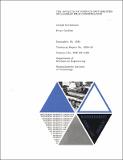The effects of surface instabilities on laminar film condensation
Author(s)
Gerstmann, Joseph; Griffith, P.
DownloadHTL_TR_1965_036.pdf (6.116Mb)
Other Contributors
Massachusetts Institute of Technology. Dept. of Mechanical Engineering.
Massachusetts Institute of Technology. Heat Transfer Laboratory.
Metadata
Show full item recordAbstract
Heat transfer rates for laminar film condensation of Freon-1l3 were measured on the underside of horizontal surfaces, inclined surfaces, and vertical surfaces. Several distinct regimes of flow were observed. On the underside of horizontal surfaces, the interface is best described as a fully established Taylor Instability. At slight angles of inclination there are three regimes of flow. Near the leading edge, the interface is smooth and waveless. Next there is a region of developing waves which are best described as longitudinal ridges. As the ridges grow in amplitude, drops are formed at the crests and subsequently fall from the surface. Beyond the point at which drops first fall, a third regime exists which can be considered to be a fully established state, independent of distance from the leading edge of the surface. At moderate angles of inclination and up to the vertical, "roll waves" appear a short distance from the leading edge. An analysis is presented which considers the surface waves to be fully established flows, resulting from bounded instabilities. It is shown that the shape of the interface can be determined without investigating the stability of the unperturbed film. The analysis results in an equation for the shape of the interface which is used to determine the average reciprocal film thickness, hence the heat transfer coefficient. The results of the analysis are valid for condensation on the underside of horizontal surfaces and slightly inclined surfaces. The wavelengths predicted by the analysis are in fair agreement with the experimentally observed wavelengths. The observed heat transfer rates agree quite well with the theory.
Date issued
1965Publisher
Cambridge, Mass. : M.I.T. Dept. of Mechanical Engineering, [1965]
Other identifiers
14072562
Series/Report no.
Technical report (Massachusetts Institute of Technology, Heat Transfer Laboratory) ; no. 36.
Keywords
Heat -- Transmission., Condensation., Trichlorotrifluoroethane.